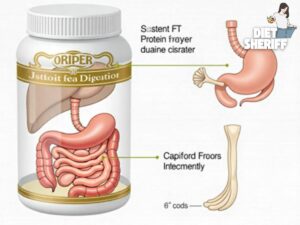Protein powder is a very common one which is consumed by lots of people around the world, mostly by the health conscious people.
Even though it’s quite convenient and has many advantages, people are frequently concerned about any negative consequences. The common question about the protein powder is, “Do protein powder have side effects?”
Overuse and improper usage of protein powder might have negative impacts on your health. It is important to know what those side effects might be, and how to mitigate them.

What are Some Potential Side Effects of Consuming Protein Powder?
A common question among protein powder consumers is “do protein powder have side effects?” Yes, there are some potential drawbacks.
Here are a few possible side effects:
Bloating and Gas: Bloating and gas can be caused by a lot of protein powders, especially those that contain whey and casein.
Related Article: Can You Put Eggs in a Protein Shake?
Diarrhea and Constipation: Distress to the digestive system can result from overindulgence and sensitivity to specific components, such as excessive fiber content.
Lactose Intolerance: Protein powders containing whey and casein include lactose, which might create digestive problems for those who are lactose intolerant.
Allergies: Certain protein sources, such milk, soy and egg protein powders, may cause allergies in certain people.
Strain on Kidneys: An excessive protein diet may cause renal damage. Particularly for people who already have renal disease.
Liver Stress: Liver function can occasionally be impacted by consuming a high protein diet. Consuming excessive amounts of protein over time might cause severe liver cases.
Vitamin and Mineral Deficiencies: An over dependence on protein powder might result in an unbalanced diet. This results in vitamin and mineral deficits that are present in entire meals.
Dehydration: A high protein diet may make you need more water since it takes more water for the body to digest protein.
Excess Calories: Excessive consumption of protein powder can increase caloric intake and result in weight gain.
Calcium Loss: Extremely high protein diets may increase the excretion of calcium, according to certain research. This may have an impact on bone health; however this is still up for discussion.
Related Article: Why Does My Protein Shake Separate?
Why Do Certain Individuals Experience Side Effects from Using Protein Powder?
Protein powder use can have negative consequences in certain people for a number of reasons.
Here are a few specific explanations for why these side effects happen:
Intolerance to Lactose
- The cause of lactose intolerance is a lack of lactase, an enzyme that converts lactose to glucose and galactose.
- Lactose ferments in the intestines if there is insufficient lactase to break it down. Following this, diarrhea, bloating and gas are brought on by the undigested lactose.
Allergies to milk (whey, casein)
- An immunological reaction to milk proteins can result in allergic responses.
- From minor (hives, itching) to severe (anaphylaxis), the allergies might be caused.
Soy Allergies
- Soy allergies occur when the body’s immune system misinterprets soy proteins as dangerous, leading to off an allergic reaction.
Egg Allergies
- Similar to other food allergies, sensitivities to the proteins in eggs can cause immunological reactions.
- For people who are sensitive to eggs, egg protein powders may trigger responses.
Digestive Discomfort due to Artificial Sweeteners
- Gastrointestinal discomfort can be caused by substances such as sugar alcohols, aspartame, and sucralose.
- Since these substances can ferment and create gas and bloating since they are poorly absorbed in the intestines.
High Fiber Content
- A rapid increase in fiber might overburden the digestive system even if it helps with digesting.
- Someone who is not accustomed to eating a high-fiber diet may suffer significant consequences from this.
Related Article: Why Is My Protein Shake Grainy: How to Effectively Avoid it?
Problems with the Kidneys
- The kidneys are in charge of removing waste from the metabolism of proteins.
- An excessive protein diet adds to this burden and can worsen conditions such as chronic renal disease.
Liver Conditions
- The liver controls nitrogen balance and breaks down amino acids.
- A high protein diet can put stress on the liver, especially in people who already have liver conditions including cirrhosis and hepatitis.
Hydration Problems
- Water is needed for protein metabolism. A high protein diet can cause dehydration if not enough water is consumed.
- This may disrupt general body processes and exacerbate kidney strain.
Excessive Protein Consumption
- When the body breaks down extra protein, urea and other waste chemicals are produced.
- Dehydration may result from this, which can put stress on the kidneys and liver.
Tips for Minimizing Side Effects due to Protein Powder
There are a lot of variables that go into minimizing protein powder side effects.
The following useful advice is provided:
Choose the Right Type of Protein Powder
Lactose-Free Options: Choose plant-based protein sources or lactose-free whey protein isolate if you are intolerant to lactose.
Hypoallergenic Proteins: Hypoallergenic choices like rice, pea, or hemp protein powders are a good choice for allergy sufferers.
Natural Ingredients: Pick protein powders that are low in artificial sweeteners, fillers and additives.
Quality Assurance
Reputable Brands: Choose goods from reliable brands that follow strict production guidelines.
Third-Party Testing: To verify the product’s purity and quality, look for certifications from agencies like NSF International, Informed-Sport, and USP.
Moderate Consumption
Follow Serving Recommendations: Respect the serving amounts that the manufacturer suggests and don’t consume more protein than you need.
Balanced Diet: Add protein powder to a well-balanced, whole-food-based diet as a supplement.
Hydrate Adequately
Increase Water Intake: Throughout the day, be sure to stay hydrated, especially before and after eating protein powder.
This will help with protein metabolism and renal function diet sheriff.
Monitor Hydration: Keep an eye out for symptoms of dehydration, such as dark urine and parched lips.
Adjust your water consumption appropriately.
Gradual Introduction
Start Slowly: If you’ve never used protein powder before, start with a lower portion. This gives your body time to adapt.
Monitor Reactions: Keep an eye on how the protein powder affects your body and modify your dosage if necessary.
Digestive Aids
Digestive Enzymes: To help with protein digestion, think about utilizing protein powders that contain digestive enzymes.
You can take enzyme supplements also.
Probiotics: Include probiotics in your diet to enhance digestion and promote gut health.
Avoid Certain Additives
Artificial Sweeteners and Sugar Alcohols: If you have stomach problems due to artificial sweeteners, look for protein powders without these additives.
Minimal Ingredients: In order to reduce the possibility of negative responses, choose protein powders with a concise, easily readable ingredient list.
Proper Timing
Post-Workout: After your workout, take a protein powder to help in muscle synthesis and recuperation.
Meal Replacement: To guarantee a balanced nutritional intake, use protein powder as an addition to meals rather than as a complete meal replacement.
Related Article: How Long Does It Take for a Protein Shake to Kick in: Deciphering the Protein Puzzle
Read Labels Carefully
Check for Allergens: Check the product’s label to be sure it doesn’t include any substances that trigger your allergies.
Nutritional Content: Make sure the protein powder satisfies your nutritional objectives, such as providing the proper ratio of macronutrients.
Importance of Proper Usage and Dosage of Protein Powder
Meeting Nutritional Needs: Makes sure you get the right amount of protein without going overboard, which helps with muscle growth and repair.
Preventing Digestive Issues: Prevents gas, bloating, and diarrhea caused by too much protein.
Protecting Kidney and Liver Health: Reduces the burden on the liver and kidneys, particularly in people with underlying medical problems.
Managing Weight: Helps prevent unintended weight gain or loss by helping to regulate calorie intake.
Avoiding Nutrient Imbalances: Helps avoid deficiencies and maintain a balanced diet.
Enhancing Performance and Recovery: When taken after an exercise, increases the synthesis and recuperation of muscle protein.
Avoiding Long Term Health Risks: Prevents long-term overconsumption from causing metabolic imbalances.
Personalizing Intake: Ensures safe and efficient usage by adjusting protein intake to meet specific demands.
Maximizing Benefits: Increases the benefit of using protein powder as a dietary supplement.
Explore Also:
Creativehouseblog
Gigasecurehome
Mycleanseplan
Do Protein Powder Have Side Effects- FAQs
Is it possible for protein powder to cause acne?
Yes, if it is contains dairy.
Does bone health depend on protein powder?
It’s still up for dispute, but diets with a lot of protein can increase the excretion of calcium.
Are there heavy metals in protein powders?
A small quantity of heavy metals may be included in some protein powders.
Does protein powder conflict with prescription drugs?
No.
Can kids eat protein powder?
Sure, if necessary.






